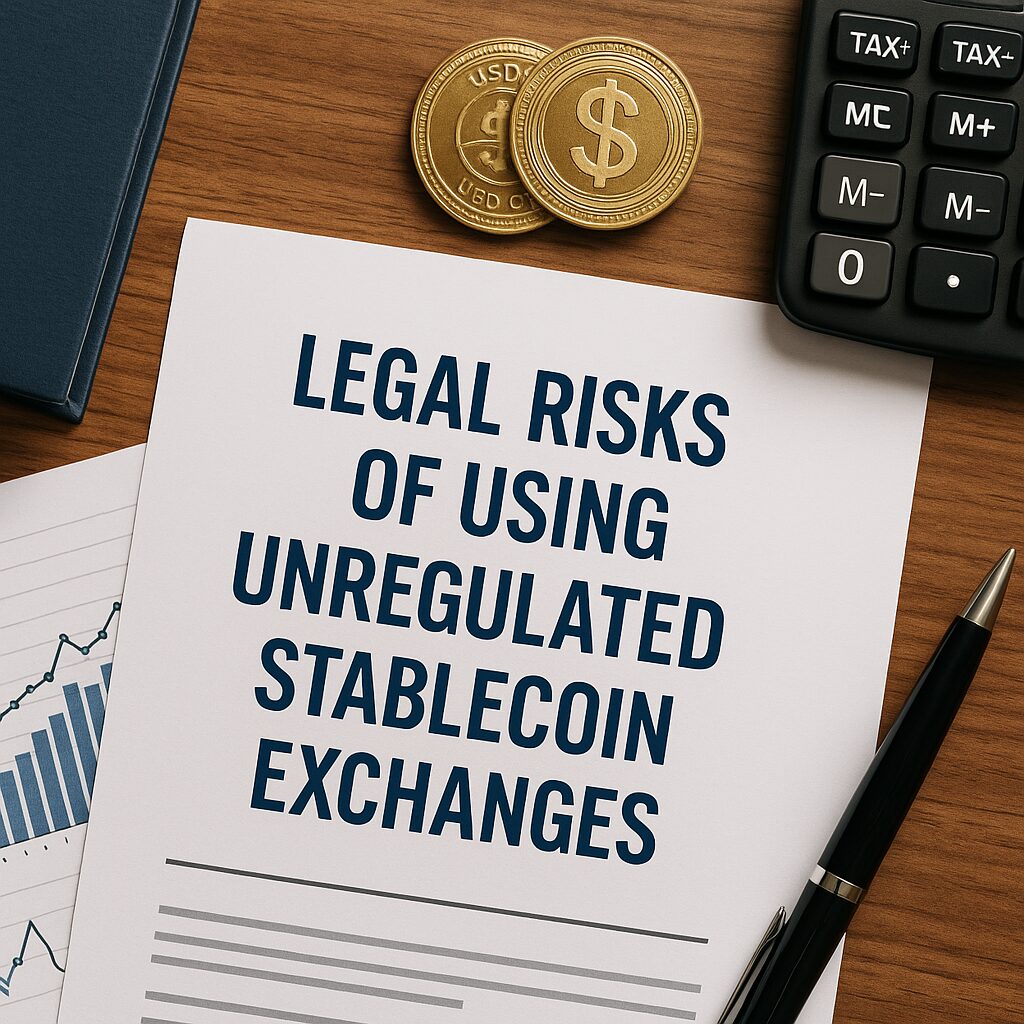The world of stablecoins promises borderless finance, passive income, and freedom from traditional banks—but that freedom comes with risks, especially when it intersects with the law.
Many platforms offer attractive yields, low fees, and instant access. But if they operate outside the legal frameworks of your country—or worse, in jurisdictions with zero oversight—you could face serious consequences: frozen funds, tax violations, and even criminal charges.
In this guide, we explore the legal dangers of using unregulated stablecoin exchanges, and how to protect yourself while still earning safely.
What Is an “Unregulated” Exchange?
An unregulated stablecoin exchange is a platform that:
- Has no license in your country or any major financial jurisdiction
- Operates without Know-Your-Customer (KYC) or Anti-Money Laundering (AML) protocols
- Is decentralized or anonymous with no legal entity listed
- Has no physical office, listed directors, or regulatory affiliations
- Offers high returns without clear disclosures
Examples may include some offshore DeFi platforms, early-stage decentralized exchanges (DEXs), and non-compliant centralized exchanges (CEXs) located in tax havens or loosely regulated territories.
Real Legal Risks You May Face
Let’s break down the most common legal hazards associated with unregulated stablecoin platforms:
1. Violation of Financial Laws in Your Country
Many governments consider using unlicensed foreign exchanges to be illegal—especially for large transactions.
Example:
In South Korea, using unregistered foreign crypto exchanges without reporting can lead to fines or criminal liability under the Specific Financial Information Act.
In the U.S., the IRS and SEC treat stablecoin profits as taxable income, and platforms that don’t comply with reporting standards may flag your account as suspicious.
2. Failure to Report Income or Capital Gains
If you’re earning interest on stablecoins—even if it’s from a DeFi platform—it’s likely considered taxable income in most jurisdictions.
Consequences:
- Audits and penalties for non-disclosure
- Interest and back taxes for unreported yield
- Account freezes if local banks detect large crypto inflows from unknown sources
3. Exposure to Sanctioned Platforms
You may unknowingly use a platform tied to sanctioned entities, which can trigger investigations, even if you acted in good faith.
Example:
The U.S. Treasury sanctioned Tornado Cash in 2022. Users interacting with its smart contracts faced account bans, wallet freezes, and legal inquiries.
4. No Legal Recourse in Disputes or Losses
When a platform collapses or exits the market, and it isn’t licensed or located in a jurisdiction with investor protections, you have no legal fallback.
You cannot sue or even send a legal notice if the company doesn’t have:
- A registered business address
- A public legal team
- Compliance disclosures
This means that even minor issues (e.g., frozen withdrawals, misreported balances) go unresolved.
5. Bank Account Risk
Receiving high-volume transfers from unknown or offshore exchanges can flag your local bank’s fraud or AML system.
Banks may:
- Freeze your account
- File a Suspicious Activity Report (SAR) with authorities
- Deny further transfers related to crypto
- Demand documentation you can’t provide from unregulated platforms
6. Future Retrospective Regulation
Even if unregulated use isn’t strictly illegal now, governments may enact retroactive laws that penalize past behaviors.
This has happened in:
- India – where regulations have shifted rapidly and unpredictably
- China – where blanket crypto bans retroactively affected miners and traders
- Turkey – where sudden laws restricted foreign crypto withdrawals
Red Flags That a Platform May Be Unregulated
| Indicator | What It Means |
|---|---|
| No KYC requirement | High anonymity; likely unlicensed |
| Very high APY (20%+) | Unsustainable, possibly illegal schemes |
| No physical address or company name | Anonymous team = no accountability |
| Rewards paid in illiquid tokens | No real business model |
| Frequent downtime or withdrawals paused | Financial instability |
Regional Legal Snapshots
| Region | Key Law or Risk Area | User Advisory |
|---|---|---|
| United States | IRS taxes interest, SEC pursues securities | Use compliant platforms only |
| EU | MiCA regulation will enforce stablecoin audits | Stick to EU-licensed services |
| South Korea | Mandatory VASP registration | Offshore platforms may trigger fines |
| UAE | Some zones crypto-friendly, others strict | Verify zone licensing |
| India | 30% tax on gains, 1% TDS on transfers | Reporting required even for DeFi |
How to Stay Safe While Earning
1. Choose Licensed Platforms
Look for services licensed in major jurisdictions (EU, US, Singapore, Australia).
2. Always Report Income
Use crypto tax software like Koinly, CoinTracker, or Accointing to log earnings.
3. Diversify Platforms
Split your holdings between 2–3 providers with different structures (e.g., Nexo + Aave).
4. Read Terms and Disclosures
Always check Terms of Use and Privacy Policy for jurisdiction, risk disclaimers, and user rights.
5. Use Wallet Analytics Tools
Services like DeBank or Zapper show platform interactions—useful for tax records and audits.
6. Avoid Platforms Without Public Teams
If there’s no LinkedIn profile, blog, or appearance by the founders, reconsider using it.
Legal vs. Safe: Not Always the Same
Sometimes, platforms may be legally permitted but not financially sound.
Other times, decentralized protocols may offer better safety than centralized but unregulated providers.
Case Study:
- Celsius was licensed and marketed in many countries, yet collapsed due to reckless lending.
- Aave is unregulated but transparent, open-source, and still operational with billions in locked value.
So, legal compliance should be one layer of your due diligence—not the only one.
Final Advice: Compliance Is a Wealth Preservation Strategy
You don’t need to sacrifice income to stay compliant.
In fact, compliance may increase your long-term ROI by:
- Avoiding penalties or losses
- Preserving access to local banks
- Reducing audit stress
- Ensuring tax-deductible losses in down years
Use the same mindset that protects stock investors:
Transparency, diversification, documentation.
